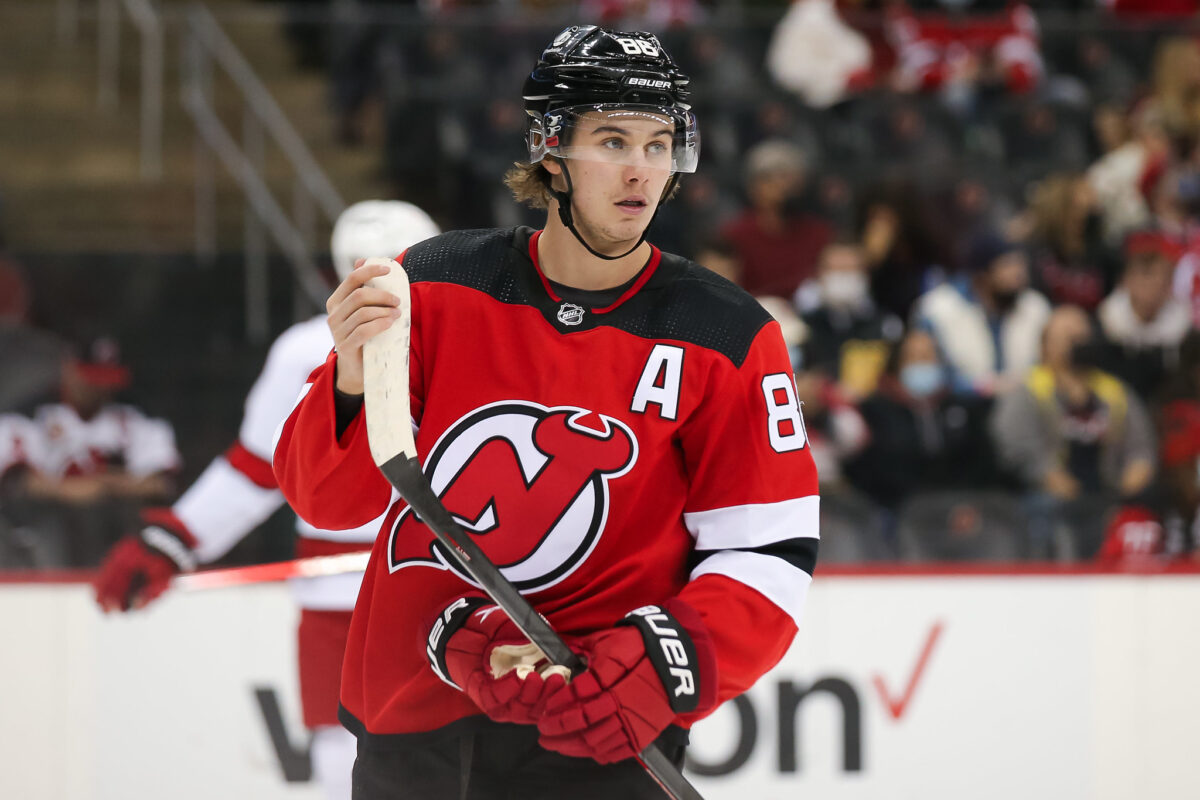Jack Hughes already had his breakout season last year, where he recorded 56 points in 49 games before getting injured, which ultimately ended his season. New Jersey Devils’ head coach Lindy Ruff stated that even though Hughes is already an elite player in the NHL, he still has another level to his game. This is what Hughes needs to do to get to that level:
Hughes Needs to Win More Faceoffs
Hughes only won 34.6 percent of the faceoffs he took last season, which was third-worst in the NHL amongst players who took more than 100 faceoffs. Faceoff percentage may not be a number that Hughes is too focused on improving since he has Michael McLeod and Nico Hischier on his team, who finished at 57.3 percent and 52.1 percent, to take any key draws, but if Hughes is able to win faceoffs at a higher rate, he’ll be able to have more puck possession and ultimately create more offense.
Ruff likes to play a possession-styled game, and Hughes is at his best when the puck is on his stick. The former first-overall-pick was third in New Jersey with a Corsi Percentage of 53.3 amongst players who played more than 10 games. Corsi percentage (CF / CF+CA) is calculated by dividing shot attempts for (CF) while a specified player is on the ice by shot attempts for (CF) plus shot attempts against (CA.) A percentage over 50 percent signifies this player’s team controlled the puck more often than the other team while he or she was on the ice.
Related: Devils Hiring Ruff Would Mean Fast-Paced Hockey
Aside from Corsi, Hughes excels with controlled exits and entries. Even though Hughes had the lowest defensive zone face-off percentage on the Devils, he finished the season in the 96th percentile in zone exits.
Just stumbled on the Jack Hughes 2021-22 XL Player Card again.
— JFresh (@JFreshHockey) July 21, 2022
Think he’s gonna be a pretty good player. #NJDevils pic.twitter.com/TXZcV90jH1
Hughes may never lead the league in face-off percentage but imagine the numbers Hughes would put up if he is able to increase his puck possession by raising his face-off percentage to a league average of 50 percent.
Continue to Improve His Shot
There is no question that Hughes improved his shot immensely from year two to year three. His shooting percentage jumped from 7.7 percent to 15.3 percent in just one season, but there is still room to get better.
“For me, working on my shot, my goal scoring,” Hughes said on the. “I think I had a pretty good year in that aspect…but if I keep that touch going it will make me even better.”
Hughes scored 58 percent of his goals in 2021-22 from the low slot area, even though 70 percent of his shots came from areas further away from the net. Hughes’ shot is becoming more accurate, but it still seems to be lacking the power to beat goaltenders from further out.

“This guy (Auston Matthews) can just pull one into his feet and snap one and beat the goalie one-on-one,” Hughes said. “That’s a hard thing to do, especially when the goalies are so good. That’s something I’ve worked on a lot.”
In addition to improving the power behind his shot, Hughes needs to work on getting more pucks on net. He had 58 missed shots last season, which was tied for eighth-most on the Devils, even though he only played 49 games. Hughes also had 73 shots blocked, fifth-most on New Jersey (from ‘NHL Scoring Leaders,’ moneypuck.com, June 23, 2022).
Hitting the post and having shots blocked may be a result of some bad luck, but if Hughes is able to get more of his shots on net, his shooting percentage will get even better, and he’ll be able to create more rebound chances for teammates to potentially score on.
Stay Healthy
Hughes only played in 49 games last season after he was placed on the injured reserve list due to a shoulder injury early in the season and a knee injury towards the end of the year. Hughes also only played in 61 games during his rookie year due to multiple injuries and illnesses. The only season where he played in every game was the COVID-shortened 2020-21 season that only consisted of 56 games.
It can be argued if there is anything Hughes can personally do to help keep himself healthy, but the matter of fact is Hughes is no help to his team when he is sidelined, regardless of the reasoning. Even though these plays may have been unavoidable on Hughes’ part, he needs to find a way to play full seasons if he hopes to propel himself into the “super-star” category.
Related: Devils Can Be Cup Contenders With Hughes & Hischier 1-2 Punch
Hughes was scoring at a 93-point pace last year before his season-ending injury, which would have been the highest point total by a Devils’ player since Taylor Hall also had 93 points in his Hart Trophy-winning 2017-18 season and the second highest since Zach Parise’s 94 points in 2008-09.
If Hughes is able to build off of last season’s success by making some slight improvements to his game, he will quickly take his game from elite to super-star level.